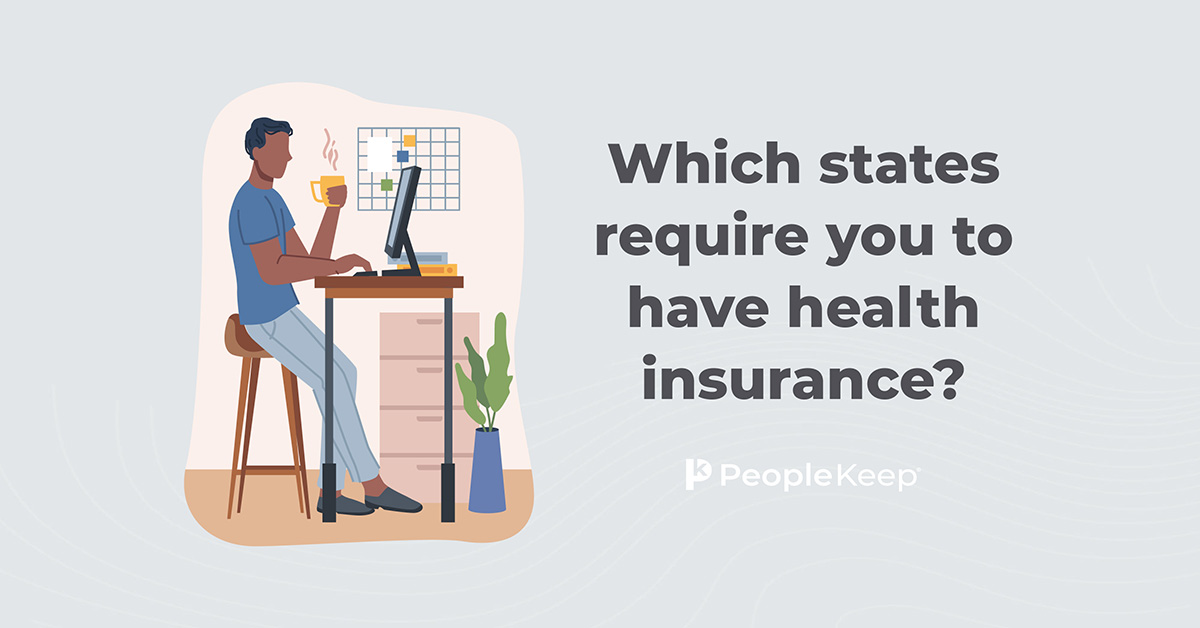State-by-state guide to health insurance marketplaces
By Chase Charaba on September 18, 2025 at 8:00 AM
The Affordable Care Act (ACA) requires every state to have a health insurance exchange or marketplace. These exchanges allow individuals and small businesses to buy their own health insurance coverage or get financial help through Medicaid, CHIP, or premium tax credits.
While some states use the federal exchange, others have their own state-run health insurance exchanges. This means that depending on where you live, the exchange you'll use to find coverage will differ.
In this blog post, you'll learn:
- What the exchanges are.
- How they differ.
- Which states have their own marketplaces.
What are the state and federal health insurance marketplaces?
The health insurance marketplaces are where individuals and families can shop for health insurance plans and receive access to premium tax credits. Depending on where you live, you can also purchase vision or dental plans. Each state has an exchange that residents must use if they want to enroll in marketplace coverage. These are either state-run marketplaces, state-federal partnerships, or the federal government's Health Insurance Marketplace.
Some employers offer group health insurance coverage to their employees. If you don't have employer-sponsored coverage, you can purchase an individual plan from the marketplaces. But the federal government doesn’t require you to have health insurance coverage. The federal government repealed the ACA's individual mandate, which previously required everyone to have health insurance coverage or pay a penalty at tax time. Now, only a handful of states require you to have health insurance.
The health insurance exchanges allow you to get a qualified health plan that covers the ACA's essential health benefits. Many people believe marketplace coverage is only for those with low incomes. However, anyone can find a plan that fits their needs. This misconception might stem from the federal subsidies available on the exchanges, such as premium tax credits. These subsidies lower your premiums, and the government bases eligibility on the federal poverty level.
Now, millions of Americans can get access to affordable health insurance coverage.
What's the difference between the Marketplaces and private exchanges?
The public Marketplaces aren't the only place you can shop for health insurance. If you're looking to buy a policy, you can also do so through a private exchange or work with an insurance broker. With a private exchange, you get a plan from an insurance carrier directly.
Learn more about the differences between public and private exchanges with our blog post.
When can you enroll in marketplace coverage?
You can enroll in marketplace plans during the annual Open Enrollment period. This runs from November 1 through January 15 in states that use HealthCare.gov. States with their own exchanges can choose a different end date.
All Americans must enroll in marketplace coverage by December 15 if they want their coverage to start on January 1. Otherwise, if you enroll by January 15, your coverage will start on February 1. However, this can differ by state.
You can still get coverage outside of the Open Enrollment period. If you experience a qualifying life event, you can get a special enrollment period (SEP). This usually gives you 60 days from your qualifying life change to sign up for or adjust your coverage.
2027 Open Enrollment
Open Enrollment will be shorter1 , starting in fall 2026, running from November 1 to December 15. Coverage will still take effect on January 1. Some states with their own exchanges may offer their own extended deadlines, while others will follow the new federal schedule.
If a state wants to extend its time period, it:
- Must begin no later than November 1.
- Can’t continue past December 31.
- Can’t last longer than nine weeks.
How does a state-based marketplace differ from the federal Health Insurance Marketplace?
A state-based exchange is where a state government regulates the exchange.
The state controls:
- Plan eligibility
- Enrollment
- Customer support
- Enrollment assistance
- Premium tax credit eligibility
- Marketing efforts
- Other state-specific subsidies.
States also deal directly with health insurance carriers to determine which plans they list on the marketplace. This includes approving annual rate increases or decreases.
The federal government runs HealthCare.gov and controls these functions in places without a state-run marketplace. This eases the burden on many states that don't have the capacity or funding to run a state-based exchange.
There are also state and federal partnerships. Some states manage their own exchanges but use the federal Health Insurance Marketplace for enrollment.
Health insurance marketplaces by state
As of 2025, 19 states and D.C. have state-based marketplaces. Three states have state-based marketplaces on the federal platform. The remaining states use the federal Marketplace.
|
State/District |
Federal or state-based health insurance exchange1 |
|
Alabama |
|
|
Alaska |
HealthCare.gov |
|
Arizona |
HealthCare.gov |
|
Arkansas |
My Arkansas Health Insurance Marketplace (you’ll use HealthCare.gov to enroll) |
|
California |
|
|
Colorado |
|
|
Connecticut |
|
|
Delaware |
HealthCare.gov |
|
District of Columbia |
|
|
Florida |
HealthCare.gov |
|
Georgia |
|
|
Hawaii |
HealthCare.gov |
|
Idaho |
|
|
Illinois |
(you’ll use HealthCare.gov to enroll) |
|
Indiana |
HealthCare.gov |
|
Iowa |
HealthCare.gov |
|
Kansas |
HealthCare.gov |
|
Kentucky |
|
|
Louisiana |
HealthCare.gov |
|
Maine |
|
|
Maryland |
|
|
Massachusetts |
|
|
Michigan |
HealthCare.gov |
|
Minnesota |
|
|
Mississippi |
HealthCare.gov |
|
Missouri |
HealthCare.gov |
|
Montana |
HealthCare.gov |
|
Nebraska |
HealthCare.gov |
|
Nevada |
|
|
New Hampshire |
HealthCare.gov |
|
New Jersey |
|
|
New Mexico |
|
|
New York |
|
|
North Carolina |
HealthCare.gov |
|
North Dakota |
HealthCare.gov |
|
Ohio |
HealthCare.gov |
|
Oklahoma |
HealthCare.gov |
|
Oregon |
Oregon Health Insurance Marketplace (you’ll use HealthCare.gov to enroll) |
|
Pennsylvania |
|
|
Rhode Island |
|
|
South Carolina |
HealthCare.gov |
|
South Dakota |
HealthCare.gov |
|
Tennessee |
HealthCare.gov |
|
Texas |
HealthCare.gov |
|
Utah |
HealthCare.gov |
|
Vermont |
|
|
Virginia |
|
|
Washington |
|
|
West Virginia |
HealthCare.gov |
|
Wisconsin |
HealthCare.gov |
|
Wyoming |
HealthCare.gov |
Illinois is transitioning to a state-based exchange for the 2026 plan year. Oregon plans to switch to a state-based exchange for the 2027 plan year.
Hawaii previously ran a state-based exchange called Hawaii Health Connector. The state has since changed to the federal Marketplace.
What health insurance plans are available on the marketplaces?
The plans available for individuals and families depend on your state. Some states will have more carriers and options than others. Every exchange has plans that fit the different ACA metallic tiers of health coverage.
These plans range from bronze to platinum and cover different portions of your healthcare costs. Catastrophic health plans are also available for those younger than 30 or who qualify for hardship exemptions. Bronze plans have lower monthly premiums but higher deductibles than other metal levels. In contrast, platinum plans have the highest monthly premiums and lowest deductibles.
The types of health insurance2 on the marketplaces include the following:
- Exclusive provider organization (EPO)
- Health maintenance organization (HMO)
- Point of service (POS)
- Preferred provider organization (PPO)
- High deductible health plans (HDHPs)
- Starting January 1, 2026, all bronze and catastrophic plans on public exchanges will count as HSA-qualified HDHPs.
How does individual health insurance benefit employers?
If you're an employer, you may wonder how individual health insurance benefits your organization. Traditional group health insurance is expensive and complex. These plans often come with minimum participation requirements and annual rate increases that small businesses struggle to meet.
Instead, employers can provide a health reimbursement arrangement (HRA) to their employees. Recent data from the HRA Council3 shows employers who offer HRAs are happy they made the switch, with 92% of employers who provided an HRA last year choosing to maintain it.
An HRA allows employers to reimburse their employees tax-free for their qualifying medical expenses, which can include individual health insurance premiums. This allows employees to choose the health plan that best fits their unique needs while saving organizations time and money.
The two types of HRAs that can reimburse individual health insurance premiums are:
- The individual coverage HRA (ICHRA): The ICHRA is an excellent health benefit for organizations of all sizes. Applicable large employers (ALEs) that offer an affordable allowance can use an ICHRA to satisfy the employer mandate.
- The qualified small employer HRA (QSEHRA): The QSEHRA is for organizations with fewer than 50 full-time equivalent employees (FTEs).
When you offer an HRA, your employees will use their state or federal marketplace (or an insurance broker) to enroll in individual coverage. You'll offer a monthly allowance to reimburse your employees for their eligible expenses, and your employees then request reimbursement for their expenses.
By administering your HRA through PeopleKeep by Remodel Health, your employees can shop for coverage right from their dashboards if you're not already working with a broker consultant.
We also save you valuable time by:
- Generating your legal plan documents.
- Verifying employee expenses per IRS guidelines.
- Automatically sending required notices so you don't have to.
- Providing award-winning customer support to ensure your HRA's success.
Conclusion
The state and federal health insurance marketplaces provide millions of Americans with access to affordable healthcare coverage. Depending on where you live, you'll either use a state-run exchange or the federal exchange. No matter which one you must use in your state, the ACA guarantees standard levels of coverage. By understanding which exchange your state uses, you'll be better prepared for Open Enrollment.
This blog post was originally published on July 19, 2023. It was last updated on September 18, 2025.
Check out more resources
See these related articles

Which states require you to have health insurance?
Curious about which states require health insurance coverage? Look no further! Discover the states with health insurance mandates in this helpful guide.

The least and most expensive states for individual health insurance
Discover the least and most expensive states for individual health insurance. Compare health insurance rates by state to plan smarter for coverage costs.

What is a health insurance subsidy?
Discover the ins and outs of health insurance subsidies with this comprehensive overview. Learn how they can help make healthcare more affordable for you.



